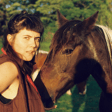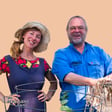
Modest Income, Major Freedom with Anisa Rogers
The first time I saw Anisa Rogers (who was basking on the grass reading a book) I thought: this person looks hekkin relaxed, has a tan consistent with living in reality, and the brightest blue eyes I’ve ever seen.
We got talking and I learned that Anisa is involved in all kinds of system-disrupting mischief in Naarm, Melbourne, as part of the Degrowth Network – and so many social justice, environmental, guerrilla gardening and new economy groups.
The reason Anisa can lead a rich life in community is that they’ve whittled their living costs down to such an extent that they’re free to be of service to their passions and values. Kudos!
🌟 Other stuff we cover
Quick & dirty capitalism explainer
Quick & lovely degrowth definition
Where activism falls short
Leaning into hard sharehouse conversations
Living on one day’s work per week
Mutual aid funds
Getting paid to process your shit
Friends sharing money
🧙♀️ LINKY POOS
Degrowth festival. November 30th in Coburg (Melbourne). Follow DNA Facebook or email degrowthnetwork@proton.me if you want to be involved
Four Day Residential Permaculture Retreat with David Holmgren + Beck Lowe at Larnook Community Farm



















